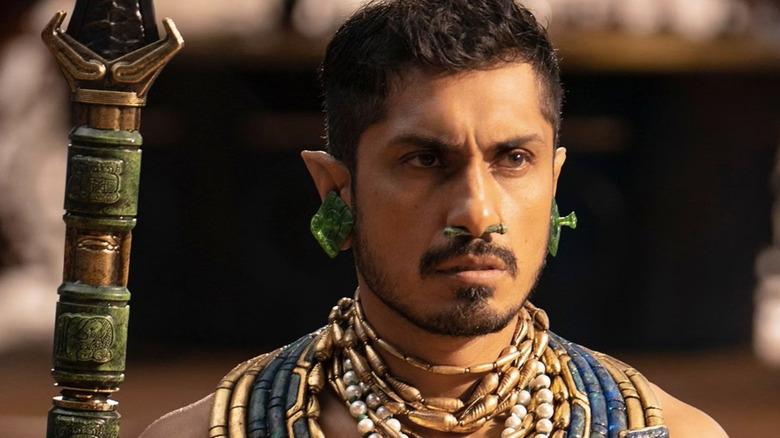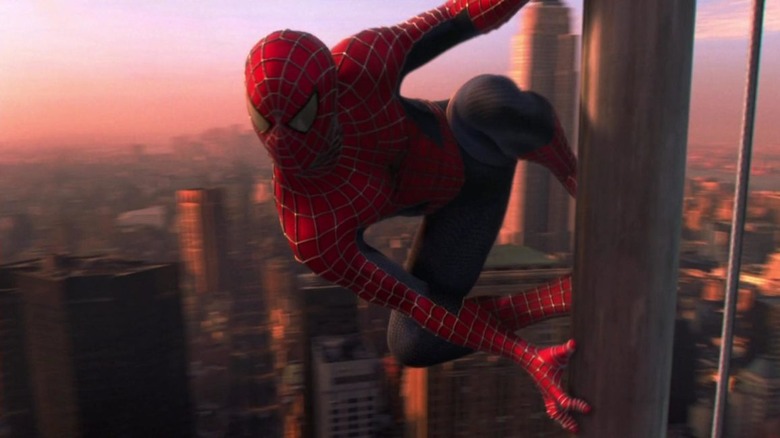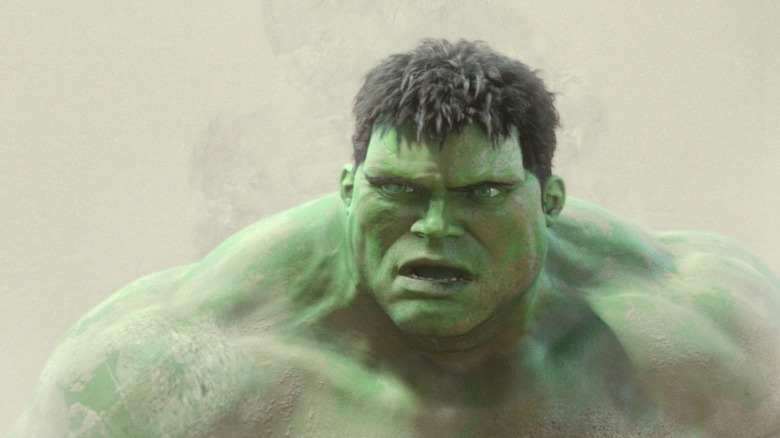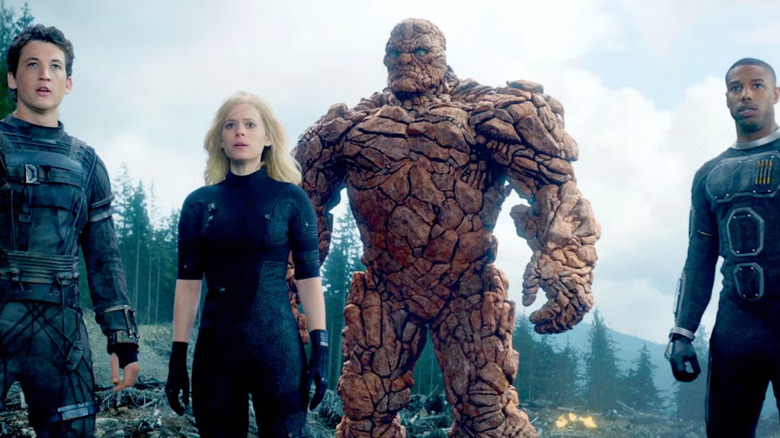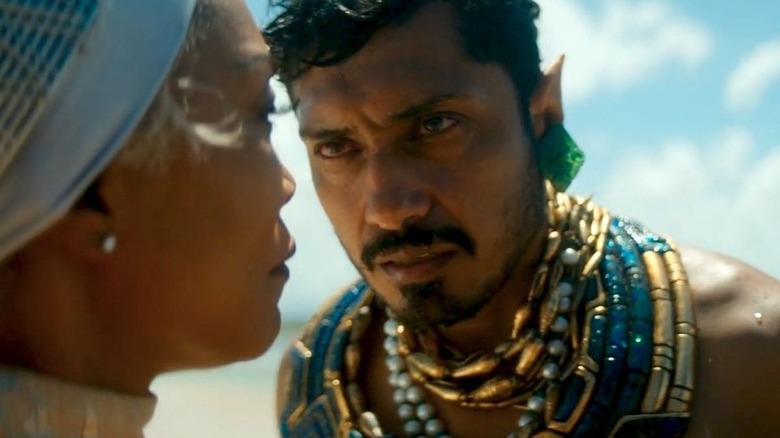Why Marvel Studios Can't Give Black Panther: Wakanda Forever's Namor His Own Solo Movie (Yet)
When a character shows up in a Marvel Cinematic Universe movie, it's usually to set them up for a spin-off. After the debut of Riri Williams/Ironheart (Dominique Thorne) in "Black Panther: Wakanda Forever," she's set to head to Disney+. However, you shouldn't hold your breath for a solo project about the movie's true break-out star: Namor the Sub-Mariner (Tenoch Huerta Mejía).
Now, Namor almost assuredly will be returning; the ending of "Wakanda Forever" all but promises that. However, it will be in another supporting role, not a headlining one. The reason why? The movie rights to Namor's character are split between Marvel Studios and Universal. This means that the two studios are in a deadlock; neither can make a Namor solo movie on their own because neither has the complete legal right to.
Let's explore the specifics of this rights-sharing deal, the history behind it, and its creative implications.
Marvel movie rights' sharing
Since the beginning, the MCU has faced restrictions on what characters it can use. That's why the whole franchise was built around the Avengers in the first place; they were the only upper-tier Marvel Universe heroes which Marvel Studios held the film rights for in the late 2000s.
The root of this goes back to 1996. That was the year of the "Great Comic Book Crash," and by the end of the year, Marvel was filing for bankruptcy. As part of a strategy to get back on stable financial ground, Marvel licensed the movie rights to their characters to several movie studios: Spider-Man to Sony, the X-Men, Fantastic Four, & Daredevil to 20th Century Fox, and the Hulk & Namor to Universal Pictures. That's why the early 2000s was when all these characters finally debuted on the silver screen — except Namor, that is.
A movie starring Namor was announced in 2001; producer Avi Arad boasted the character could become, "one of Marvel's biggest franchises." However, unlike Universal's "Hulk," the Sub-Mariner never made it off the ground.
Precedent with the Hulk
25+ years later, the rights situation has shifted. Sony and Marvel have famously negotiated a rights-sharing deal with Spider-Man; Sony produces Spider-Man movies set in the MCU and featuring guest stars from the franchise, while Spider-Man can appear in certain Marvel Studios movies.
As for the Fox characters; the studio let the "Daredevil" rights revert to Marvel outright in 2013. Marvel's parent company Disney purchased Fox in 2019 — this merger meant the X-Men and Fantastic Four reverted to Marvel by default. That's why 2022's "Doctor Strange in the Multiverse of Madness" finally saw Reed Richards and Professor X (played by Patrick Stewart no less) appear in the MCU.
Then there are Universal's characters. While the Hulk has been an MCU mainstay since the beginning, he hasn't had a solo project since 2008. This isn't just because the Green Goliath's first two silver screen adventures weren't home runs. It's because Marvel can't make one without Universal's involvement, nor use the Hulk as the sole focus of marketing materials. Indeed, while "The Incredible Hulk" was produced by Marvel Studios, it was distributed by Universal Pictures.
Mark Ruffalo, the MCU's Bruce Banner, has said another standalone Hulk movie will "never happen" because the two studios haven't been able to manage a similar collaboration. However, Marvel retains the rights to put Hulk in other films, like "The Avengers" and "Thor: Ragnarok," and the Hulk's television rights (hence "She-Hulk: Attorney at Law").
According to both Marvel Studios head Kevin Feige and "Wakanda Forever" producer Nate Moore, Namor is in a similar boat as the Hulk.
How long does the deal last?
In a 2014 interview with IGN, Feige addressed rumors of Universal and Legendary Pictures making a "Sub-Mariner" movie. While they could not do so without Marvel Studios' involvement, Marvel themselves couldn't make one on a whim either. According to Feige:
"It's slightly more complicated than [Marvel just making a "Sub-Mariner" movie]. Let's put it this way — there are entanglements that make it less easy. There are older contracts that still involve other parties that mean we need to work things out before we move forward on it. As opposed to an Iron Man or any of the Avengers or any of the other Marvel characters where we could just put them in."
Feige reiterated that things are "complicated" in a subsequent 2018 interview. It's possible that Universal's hold on Namor comes with an expiration date. Sony, for instance, had to produce a "Spider-Man" movie every five years and nine months to keep the Web-Slinger's rights. That's why, instead of letting the franchise simmer after "Spider-Man 4" fell apart, they rushed a reboot with 2012's "The Amazing Spider-Man." The Fantastic Four have also suffered this pump-and-dump rights grabbing twice, in 1994 and 2015. However, it's unclear if/when Universal's deal on the Namor rights expires.
Ramifications on Wakanda Forever
Namor in "Wakanda Forever" differs quite a bit from his comic counterpart. He and his people are reimagined as descendants of the Mayans. Fittingly, their kingdom is known as Talokan rather than Atlantis. One could imagine Universal vetoed a more traditional Namor or this was Marvel trying to sidestep the deal. However, this wasn't the case.
Speaking to The Wrap, "Wakanda Forever" producer Nate Moore revealed the changes to Namor weren't because of the rights sharing, but simple creativity. He said:
"[The rights situation] honestly affects us more, and not to talk too much out of school, but in how we market the film than it does how we use him in the film. There weren't really things we couldn't do from a character perspective for him ... I've read every Namor comic ever written and I love them, but the world of Atlantis is a little vaguely drawn. It's maybe kind of Roman. And so, Ryan [Coogler] is such a detail-oriented filmmaker that he wanted to anchor into something that felt as tangible and real as hopefully Wakanda feels for people. And I think there was nothing from a business side anyway that was preventing us from doing that, which is great."
While "Wakanda Forever" definitely made me want to see more of Talokan, I'm not aching for a Namor solo movie. The Sub-Mariner has traditionally worked best as a foil to other characters, whether it be to the Black Panther, the Fantastic Four, Captain America, or Doctor Doom. If anything, Namor's depiction in the MCU thus far only shows why he doesn't need a solo movie to be a star.
